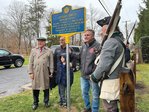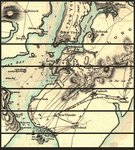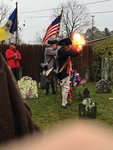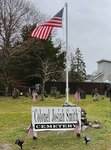



Under lowering clouds with light rain winnowing against old headstones, local residents and elected officials from the Town of Brookhaven gathered at a small family cemetery on Paquatuck Avenue to garland wreaths and place a New York State Marker remembering Col. Josiah Smith’s service during the Revolutionary War as commanding officer of The Militia – Suffolk County, First Regiment of Minute Men, from Long Island, N.Y.
It was Aug. 21, 1776, and weeks prior, “In the Battle for Long Island,” some 30,000 British troops (Red Coats) amassed in Brooklyn and New York Harbor described as “all of London,” in response to Bunker Hill and the signing of The Declaration of Independence. In fear, a call for arms heralded throughout the Colonies, and a whirlwind of activity and the building of fortifications and placement of troops commenced on Long Island, also known as Brooklyn. English King George, beset on taking New York and dividing the Colonies geographically, hoped to arrest or kill self-identified Patriots fighting for selfhood, like George Washington. And this may have happened, if only the British commanding general Howell had listened to his officers and soldiers and continued the attack.
Undeterred by this opposition, Col. Smith and the Suffolk County Minutemen responded to British claim with deadly force on the 27th of August. It was the heaviest day of fighting when British Gen. Howell ordered 20,000 infantry soldiers stationed in Flatbush (Flatbush, Brooklyn) to attack under Gen. Cornwalis, who then, latterly ordered half his force to flank the Colonists. By British accessing an old Native American trail near Jamaica Pass, they found entry to the rear of the Colonial forces, essentially surrounding them. Yet, American Colonial Maj. Mordecai Gist and The Maryland 400 heroically attacked at the Vechte-Cortelyou House, “The Old Inn” near Park Slope, and took the fight to the British with waves of frontal assaults, as some Colonial battle lines held firm led by Smith late into the evening.
“We were alarmed at 2 in the morning and had many scurmishes (skirmishes) and they attempted to force our lines & they killed 1 of mine and we suppose that we killed a number of them, & and we drove them back & lay in the trenches all night,” Smith from his diary Aug. 27, 1776.
Against all odds, Washington and his forces were pushed back to the East River as other defensive lines were broken, and soldiers dispersed from high ground near Park Slope to “The Heights,” known as Guan, and farther west known as Gawanus Creek. While attempting to transverse marsh and boggy waters under gunfire, young Colonial foot soldiers were ripped apart and cut to the waist by Hessian muskets (Mercenaries hired by King George from the Prince of Germany), who were surrounded and slaughtered to high-pitched cries. It was only the frontal assaults of the Maryland 400 and men who stood their ground that offered salvation for Washington and his 1200 men with the river to their backs. A slight delay by the British not to attack, the Colonial Marblehead Marauders from Massachusetts with their boats and sea vessels under the cover of a dark moonless sky evacuated Washington and his men to live, to fight in the hill-streets of Manhattan and White Plains in the following weeks and months.
Today, those canals, and creeks, and swamps where many died in Brooklyn are referred to as “Black Mayonnaise,” due to pollution and raw sewage from the many Americans that came after, for what Washington once called a “Divine Providence.”
Thus, free people to the East remember Smith with a blue steel marker, and all men and women who have answered our county’s call, in rumination of life and liberty. It was Col. Smith, who fought in the trenches and rain for days after Aug. 27 and marched to New Rochelle with the New York Minute Men to rendezvous with other regiments. On Sept. 1, he ferried back to Smithtown to his family homestead as grandson of “Bull” Smith, and was later arrested and jailed becoming a prisoner of war in the notorious Provost Prison in downtown British-controlled Manhattan. Released under house arrest, he was forced to live in Connecticut until the end of the war and returned to East Moriches, where he resided with his wife, Susannah Gelston, and their four children until his death.
“We are stronger as a nation remembering those that served,” said Edward P. Romaine, Brookhaven Town supervisor at the Marker Commemoration, and one would have to agree. The Sons and Daughters of the American Revolutions were directly involved in this ceremony and provided literature and information to support this narrative.
Comments
No comments on this item Please log in to comment by clicking here